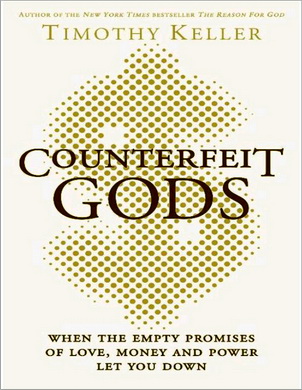
Keller Timothy - Counterfeit Gods
After the global economic crisis began in mid-2008, there followed a tragic string of suicides of formerly wealthy and well-connected individuals. The acting chief financial officer of Freddie Mac, the Federal Home Loan Mortgage Corporation, hanged himself in his basement. The chief executive of Sheldon Good, a leading U.S. real estate auction firm, shot himself in the head behind the wheel of his red Jaguar. A French money manager who invested the wealth of many of Europe’s royal and leading families, and who had lost $1.4 billion of his clients’ money in Bernard Madoff’s Ponzi scheme, slit his wrists and died in his Madison Avenue office. A danish senior executive with HSBC Bank hanged himself in the wardrobe of his PS500-a-night suite in Knightsbridge, London. When a Bear Stearns executive learned that he would not be hired by JPMorgan Chase, which had bought his collapsed firm, he took a drug overdose and leapt from the twenty-ninth floor of his office building. A friend said, “This Bear Stearns thing … broke his spirit.” It was grimly reminiscent of the suicides in the wake of the 1929 stock market crash.
In the 1830s, when Alexis de Tocqueville recorded his famous observations on America, he noted a “strange melancholy that haunts the inhabitants … in the midst of abundance.” Americans believed that prosperity could quench their yearning for happiness, but such a hope was illusory, because, de Tocqueville added, “the incomplete joys of this world will never satisfy [the human] heart.” This strange melancholy manifests itself in many ways, but always leads to the same despair of not finding what is sought.
There is a difference between sorrow and despair. Sorrow is pain for which there are sources of consolation. Sorrow comes from losing one good thing among others, so that, if you experience a career reversal, you can find comfort in your family to get you through it. Despair, however, is inconsolable, because it comes from losing an ultimate thing. When you lose the ultimate source of your meaning or hope, there are no alternative sources to turn to. It breaks your spirit.
What is the cause of this “strange melancholy” that permeates our society even during boom times of frenetic activity, and which turns to outright despair when prosperity diminishes? De Tocqueville says it comes from taking some “incomplete joy of this world” and building your entire life on it. That is the definition of idolatry.
Timothy Keller - Counterfeit Gods - When the Empty Promises of Love, Money and Power Let You Down
London: Hodder & Stoughton Ltd, 2009. – 99 p.
Epub ISBN: 978 1 848 94853 2
Book ISBN: 978 0 340 99507 5
Timothy Keller - Counterfeit Gods – Contents
Introduction: The Idol Factory
- ONE. All You’ve Ever Wanted
- TWO. Love Is Not All You Need
- THREE. Money Changes Everything
- FOUR. The Seduction of Success
- FIVE. The Power and the Glory
- SIX. The Hidden Idols in Our Lives
- SEVEN. The End of Counterfeit Gods
Epilogue: Finding and Replacing Your Idols
Notes
Bibliography
Acknowledgments





Комментарии
Пока нет комментариев. Будьте первым!